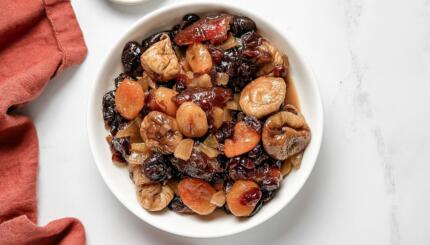A few months ago, I had the pleasure to, quite literally, sit at the same table with Chef Paula Shoyer during a kosher food bloggers social media dinner. Nope, folks – I can’t even make this stuff up. Paula Shoyer is the author of The Kosher Baker, and most recently was featured as a contestant on the Food Network’s Sweet Genius!
I absolutely fell in love with Paula’s attitude for quality kosher food and expertise in pareve desserts. I had the chance to chat with her recently, and am now even more enamored. Anyone who “dreams of pareve dulce de leche” is a cook after my own heart. My favorite quote from her? “At a minimum, desserts must always be worth the calories or do not bother eating them.” Couldn’t agree more.
What has inspired your passion for baking and waist-friendly kosher cooking?
My grandmother was a fabulous baker and my book is dedicated to her memory. I am always looking for ways to make my desserts healthier. At a minimum, desserts must always be worth the calories or do not bother eating them.
The Nosher celebrates the traditions and recipes that have brought Jews together for centuries. Donate today to keep The Nosher's stories and recipes accessible to all.
What meal or dessert does your family ask you to make more than anything else? What is your favorite thing to make? Least?
My family loves when we have burritos during the week. I make a black bean chili, rice, guacamole and salad and everyone makes their own. My four kids always want there to be rolls of my double chocolate chip cookie dough in the freezer so they can slice and bake when they want. My favorite desserts to make are the fancy French desserts with layers of cakes and creams and glazes, yet my favorite desserts to eat are the simpler ones such as scones. I love my scones. I can’t say there is any food or dessert I don’t like to make.
Which ingredient do you wish you could find kosher?
The ingredients I wish I could find pareve are a healthier pareve whipping cream and dolce de leche. I dream of pareve dolce de leche.
It’s been a crazy week, and you haven’t even given thought about what to make for Shabbat Dinner – what’s your go-to meal?
Beef Barley Soup, Garlic Chicken, rice, string beans with garlic, Orange Tea Cake (cover recipe from The Kosher Baker)
If you could only give one tip to a fellow kosher food enthusiast, what would it be?
Make homemade desserts – they are delicious and significantly healthier than packaged and even bakery desserts.
What’s next for Chef Paula Shoyer: Any more TV appearances? A new cookbook?
I am hoping for more TV appearances around Passover. I do have an idea for a great TV show. The next book is The Passover Baker and I am busy creating recipes people have never seen on Passover before such as black and white cookies.
Ingredients
Spray oil containing flour or spray oil plus 2
tablespoons flour for greasing and flouring pan
½ cup canola oil
¾ cup sugar
¼ cup honey
1 cup canned pumpkin purée (not pumpkin pie filling)
1 teaspoon pure vanilla extract
2 large eggs
1 cup all-purpose flour
½ cup whole wheat flour
½ cup spelt flour
½ teaspoon salt
1 teaspoon baking powder
1 teaspoon baking soda
1 teaspoon ground cinnamon
1 teaspoon ground ginger
½ teaspoon ground cloves
½ teaspoon fresh ground nutmeg
Directions
Preheat the oven to 350°F. Grease and flour a Bundt or tube pan.
In a large bowl, beat the oil, sugar and honey with a stand or hand-held electric mixer on medium-high speed until mixed. Add the pumpkin purée and beat again.
Use a silicone spatula to scrape down the bowl. Add the vanilla and eggs and mix well. Add the white, wheat and spelt flours, salt, baking powder, baking soda, cinnamon, ginger, cloves, and nutmeg. Mix all the ingredients together. Use a silicone spatula to scoop the batter into the pan and then smooth the top.
Bake for 45 minutes, or until a skewer inserted comes out clean.
Let cool for 10 minutes in the pan and then turn out onto a rack and let cool completely.
kosher
Pronounced: KOH-sher, Origin: Hebrew, adhering to kashrut, the traditional Jewish dietary laws.
pareve
Pronounced: PAHRV or pah-REV, Origin: Hebrew, an adjective to describe a food or dish that is neither meat nor dairy. (Kosher laws prohibit serving meat and dairy together.)
Shabbat
Pronounced: shuh-BAHT or shah-BAHT, Origin: Hebrew, the Sabbath, from sundown Friday to sundown Saturday.


